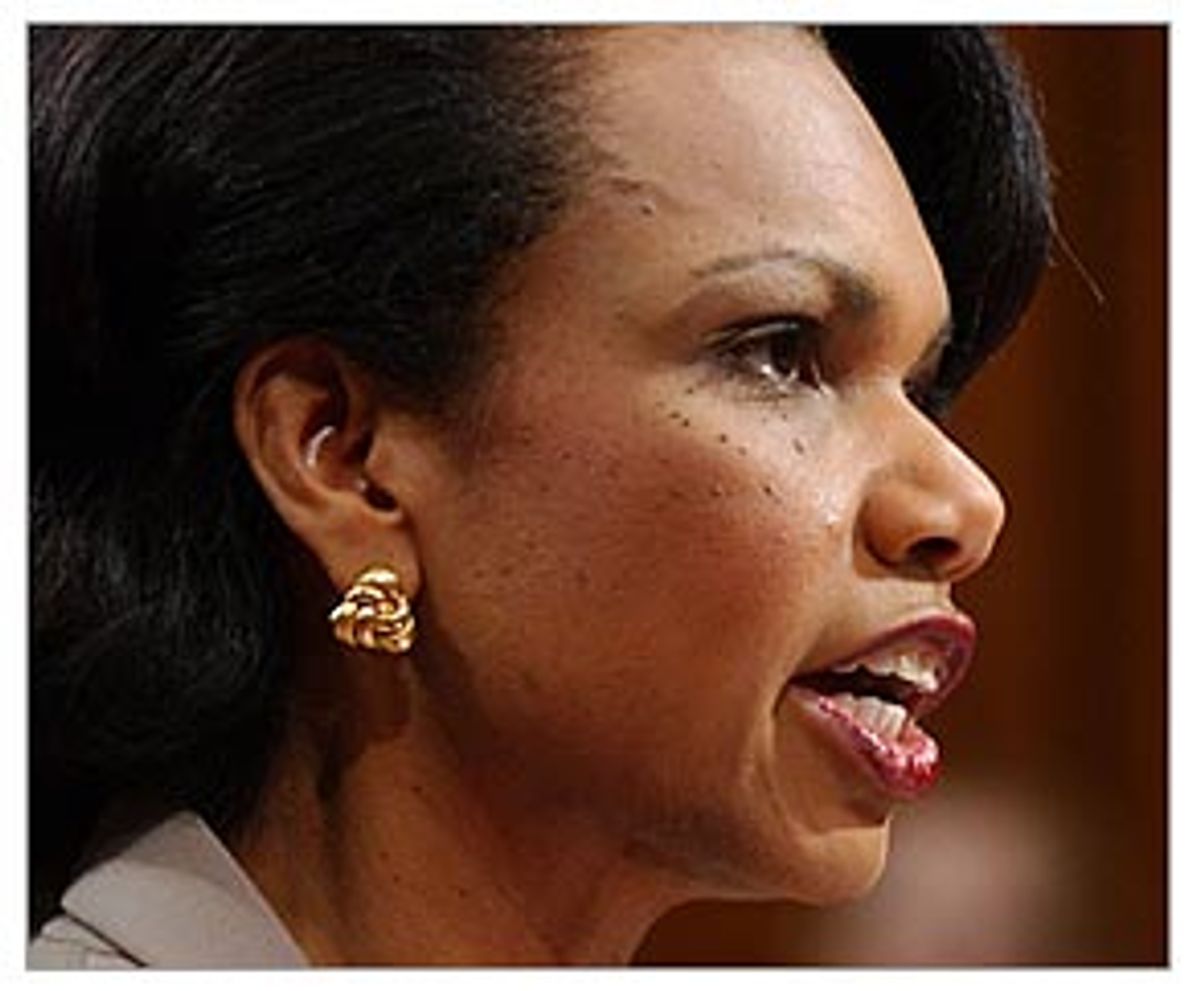The public testimony of Condoleezza Rice before the 9/11 commission had a strategy and a structure, to use terms that she favors. The obvious strategy was to swathe every answer to a challenging question from the commissioners in "context" that did more to obfuscate than clarify. The underlying structure of her statements shifted responsibility away from the Bush White House, in any direction possible: toward previous administrations, the FBI, the CIA and, as subtly as possible, toward former counter-terrorism chief Richard Clarke.
Rice was nothing if not repetitive in her response to the main issue before the commission and the country. Like the president himself, she assured us again and again that if only al-Qaida had revealed the date, timing, location and methods to be used in the attacks on Sept. 11, 2001, the White House would surely have done everything in its power to thwart the threat. That, of course, is the answer to a question nobody has bothered to ask.
The pertinent question is not whether the president would have tried to stop an attack whose details were thoughtfully placed under his nose. The real question is whether the Bush administration paid sufficient attention to the stream of warnings it received about al-Qaida, or whether, due to its preoccupation with Iraq, missile defense and other matters, those officials simply failed to act. This is the million-dollar question that Rice so expertly dodged on Thursday.
The most concrete evidence of administration fecklessness is the now-notorious Aug. 6, 2001, presidential daily briefing, or PDB, delivered to George W. Bush while he vacationed at his ranch in Crawford, Texas. Although its existence was first revealed almost two years ago, yesterday's hearings brought fresh attention to its still-classified contents.
Until Rice answered a sharp question from commissioner Richard Ben Veniste, most Americans probably didn't know that weeks before Sept. 11, the president had been given a CIA memorandum with the ominous title "Bin Laden Determined to Attack Inside the United States." The national security advisor insisted that this "historical analysis" of al-Qaida did not provide "new threat information." But her dismissal of the controversial document undermined her own argument for keeping it classified. If the Aug. 6 PDB was merely of historical interest, why not prove her point by allowing the memo to be published in full?
Commissioner Bob Kerrey later provided another tantalizing glimpse of the PDB's contents that demonstrated why the White House wants to keep it secret. "In the spirit of further declassification," said Kerrey, "this is what the Aug. 6 memo said to the president: that the FBI indicates patterns of suspicious activity in the United States consistent with preparations for hijacking. That's the language of the memo that was briefed to the president on the sixth of August."
In the context of what Clarke and others have said about the "threat spike" during the prior two months, that warning seems stark enough to provoke serious action. According to Rice, she and the president assumed that the FBI, the Federal Aviation Administration and the rest of the federal bureaucracy had done whatever they could -- given the "structural impediments" in a dysfunctional Washington bureaucracy.
How dysfunctional was the Bush administration during that fateful summer? Commissioner Jamie Gorelick challenged Rice's assertion that federal agencies and their field offices had been put on alert status during the threat spike. Citing previous commission interviews with the FAA administrator, FBI officials from around the country, and Secretary of Transportation Norman Mineta, among others, Gorelick said that none of them had ever heard the warnings of a potential attack.
Were the FBI field offices and other relevant federal employees called to their battle stations, as Rice claimed, or were they not? Presumably the commission will assess that contradiction in its final report (which may or may not be released before the November election).
Rice's testimony raised more questions than she answered. Was she truthful in describing Clarke's Jan. 25, 2001, plan to attack al-Qaida, which remained in bureaucratic limbo until a week before Sept. 11? Nobody will know unless and until that document, too, is declassified. What about the task force headed by Vice President Dick Cheney, which was supposed to begin assessing homeland security in May 2001, but reportedly never met until after Sept. 11? Rice mentioned the Cheney task force but was not asked about its inactivity.
The national security advisor walked away from the witness table, never to return, with her characteristic poise intact, and without apologizing or acknowledging any error. Stripped of all the seminar verbiage, her message was simple enough for her boss: Nothing could have been done to prevent Sept. 11, and the Bush administration did everything within its authority and ability to deal with the terrorist threat.
But the Bush strategy for deflecting criticism is breaking down, despite Rice's cool demeanor and steely tone. The true narrative is seeping out, and the hidden facts are leaking out. What remains to be seen in the coming weeks is whether the 9/11 commission possesses the courage and commitment to complete that process, no matter where it may lead.



Shares